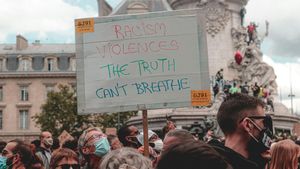Raksha Bandhan, celebrated across India, is no ordinary festival; it marks the beautiful bond between brothers and sisters. This year, the festivities unfolded amid local traditions, where siblings engaged in rituals filled with color, joy, and heartfelt emotions.
The essence of Raksha Bandhan is represented by the tying of 'rakhi,' which is traditionally done by sisters on their brothers’ wrists. This thread symbolizes protection, love, and duty, capturing the spirit of familial ties.
During the celebrations, families prepare delicious sweets, adorned with vibrant colors and flavors. The exchange of gifts between siblings is customary, highlighting love, care, and the warmth of these relationships.
High-profile figures also joined the festivities, emphasizing the festival's importance. Prime Minister Narendra Modi celebrated with schoolgirls tying rakhis on his wrist, showcasing the universal love associated with Raksha Bandhan.
Modi took to social media, extending his wishes to all citizens and praying for happiness and prosperity. His heartfelt message emphasized the significance of sibling relationships and the love they impart.
Equally active was President Droupadi Murmu, who shared her greetings through social media. She expressed hopes for increased affection and respect toward sisters and daughters, urging all citizens to contribute toward women's safety and dignity.
Meanwhile, several local governments organized ceremonies to honor this special occasion. Such events underline the nationwide communal spirit, transcending geographical boundaries.
Union Minister Piyush Goyal also celebrated Raksha Bandhan, tying rakhi with women refugees from Pakistan. This moment was particularly poignant, as it served to symbolize inclusivity and cultural integration, especially for those who have recently found new homes.
Minister Goyal expressed joy at the occasion and the opportunity to connect with his sisters through the cultural thread of rakhi. His celebration linked citizenship rights with the festival, emphasizing the government’s aim to provide respect and safety to all citizens.
The festive atmosphere was thick with warmth and mutual respect, as families came together to celebrate age-old traditions. The event reflected love and unity, central themes of Raksha Bandhan.
Many communities also took this festival as an opportunity to promote social causes. It became moments to call for the protection of women and promote their rights within society.
Organizations across India held campaigns urging citizens to pledge for women's safety as part of their Raksha Bandhan celebrations. This outreach indicates the festival's evolution, integrating social responsibility with traditional practices.
Despite traditional celebrations, contemporary influences also shaped this year's events. From modern greetings via social media to community engagements, Raksha Bandhan embraced innovation.
People used creative ways to express love, involving technological platforms for greetings and gatherings. This blend of tradition and modernity shows the festival's adaptability yet respect for its core values.
While the festival has evolved, local customs retain deep roots alive through rituals. Festivities often draw from regional traditions, demonstrating the rich diversity within Indian cultures.
Jewelry and textiles crafted for the occasion highlighted artisanship, once again stressing the importance of supporting local businesses. This showcases how Raksha Bandhan enables economic benefits alongside cultural celebrations.
Social media was abuzz with pictures capturing festive moments. Families shared their unique traditions, offering glimpses of how different households celebrate this cherished festival.
Artists and craftsmen participated enthusiastically, creating special rakhis and festival-related merchandise. This inclusion not only enriches the celebrations but also reinstates the value of traditional arts.
One cannot ignore the sweetness of homemade delicacies prepared during Raksha Bandhan. From laddoos to barfis, these sweets are synonymous with joy and celebrations.
Celebrants often reflect on the memories attached to these treats, reminiscing about the bonding moments shared over sweets and laughter. Food during Raksha Bandhan is not just about nourishment; it’s about love served on plates.
Communal gatherings also flourished, where families and friends came together to partake in the festivities. Such occasions reinforce the importance of togetherness, shedding light on the emotional significance behind the festival.
Across urban centers, community events held workshops and rallies promoting women’s safety and rights. Through educational programs, attendees engaged with experts, discussing women empowerment alongside the joyful spirit of Raksha Bandhan.
This year’s moments, filled with laughter and reflection, rekindled bonds anew. Such surroundings cultivate unity among families and communities, enhancing relationships.
Raksha Bandhan remains deeply rooted as a festival of protection, which extends far beyond mere symbolism. It continues to evolve, addressing societal changes and fostering important discussions.
Even as new issues arise, Raksha Bandhan's core values endure. Love, moisture, and the essence of protection echo through the rituals and observance of this cultural event, keeping traditions alive.
The bonds strengthened during this festival spill over, inviting respect and caring attitudes throughout the year among siblings and communities. Together, they all embody the festival's true spirit, amplified during this heartwarming time each year.
Traditionally, girls would tie sacred threads on their brothers' wrists, representing their affection and prayers for their well-being. Brothers would, in return, pledge to protect their sisters from any harm, reinforcing mutual respect within these relationships.
Throughout India, Raksha Bandhan holds its place as one of the most awaited festivals of the year. It serves to remind everyone of familial bonds, cultural heritage, and the need for community care.



